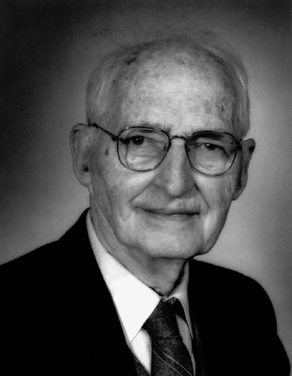
With the passing of William J Turner, MD on January 1, 2006 at the age of 98 years, the College remembers, respects, and celebrates the life of one of its most energetic and remarkable founders.
The archives reflect that Bill Turner was a first-generation psychiatric researcher, being almost alone (as early as the 1930s) in focusing on the biological cause of mental illness. To provide a glimpse of the depth of his interest in research, his first peer-reviewed paper was published in 1935; his last in 1995. For 60 of his 98 years he published scientific information relevant to the understanding, care, and treatment of the mentally ill.
As a research scientist, biochemist, psychiatrist, and geneticist, Bill Turner's work was seminal. In the early 1930s, he studied porphyria. During World War II, he was interested in glucose regulation in depression. In the 1950s he became interested in reserpine's effect on fish—looking for animal models. In the 1960s, with the emergence of chlorpromazine, which introduced an entirely new treatment paradigm, he studied the relationship between the electroencephalogram and biological measures of psychiatric illness. Through the 1960s and 1970s, his work reflected his interest in the genetic inheritance pattern of mental illness; being the first to identify chromosome 6 as important in the genetics of mental illness. During the 1970s and 1980s, his studies focused on the genetics of gender, and he was the first to publish that a major type of Kinsey, grades 5 and 6 male homosexuality is determined by a gene in the Xq28 region. His CV reflects the decade by decade advances and attempts to understand the underlying causes of the different illnesses that affected the patients for whom he so deeply cared.
Born September 22, 1907, William Turner graduated from Penn State with a degree in chemistry and then entered Johns Hopkins, graduating from its medical school in 1933. After his residency, he joined the Veterans Administration, where he remained until 1950 working with electroencephalograms and ECT. He served in the US Army and was retired in 1946 with the rank of Lieutenant Colonel. As Senior Research Psychiatrist at Central Islip State Hospital and as Professor of Psychiatry at State University of New York at Stony Brook, he continued to work well past the mandatory retirement age of 70 years.
Bill Turner was interviewed for the ACNP archives at the 1994 annual meeting in San Juan, at that time being a perceptive and lively 87 years, decked out in a pale blue tropical suit. He recalled the excitement of ACNP formative meetings in Washington, DC as ‘an explosion of enthusiasm, devotion and a real-life expectation that medications would transform the care and treatment of the mentally ill.’
His response as to how he might wish to be remembered was that essentially, he was a messenger—able to transmit all that he had learnt in science and research to the relatives of the mentally ill so that they in turn would continue to support this vital work. Dr Turner formed the first Suffolk County chapter of the National Alliance for the Mentally Ill, (NAMI). He received the New York State Outstanding Scientist of the Year award from NAMI.
His brilliance as a scientist and his generosity as a clinician remains as his enduring legacy to the enviable record that these ‘relatives’ have achieved and continue to achieve in support of research of the highest order (NARSAD) in the treatment and care of the mentally ill.
William J Turner, one of the cadre of revered founders of the College expressed the hope that younger scientists would ‘bear the torch and continue in quiet discussion and scientific contemplation.’ He stated that ACNP was one of the few scientific organizations that is still doing what it set out to do. His perseverant example still shines.
Dr Turner is survived by his sons William M, James Q, Douglas W, and their wives and grandchildren in Albuquerque, New Mexico.
He is remembered with reverence and deep affection by all who came in contact with him.
Author information
Affiliations
Rights and permissions
About this article
Cite this article
Engelhardt, J. William J Turner, 1907–2006. Neuropsychopharmacol 31, 1839 (2006). https://doi.org/10.1038/sj.npp.1301106
Published:
Issue Date: